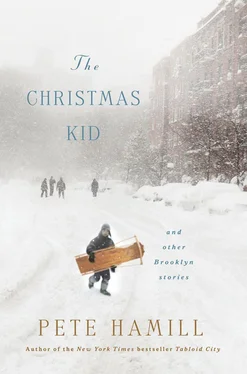“¿Cómo se dice ‘loco’ en inglés?” the mother asked.
“Crazy,” Mercedes said.
“Ah, sí,” the mother said. “Crazy. Es Crazy. Este Irlandes es crazy.”
Yes, Mercedes said, the Irishman was crazy, but wasn’t he crazy like her father? Didn’t Papi sit in the house in Santo Domingo cutting articles out of newspapers, piling them up in closets, asking everybody questions about everything under the sun? Didn’t Papi know about baseball and ice-making machines and Indian gods and the Gulf Stream? Yes, her mother said, and he died young.
Facts came back from the kitchen with three cups of coffee.
“It’s an interesting place, the Dominican Republic,” he said. “Known by the Indians as Quisqueya, eighteen thousand, eight hundred and sixty-one square miles, population, about five million, four hundred and fifty thousand in 1980.” He sipped his coffee. Mercedes looked at him with glassy eyes. “The main rivers are the Yaque del Norte, the Haina, the Ozama, and the Yaque del Sur.” The mother squinted at him, impressed by the names of familiar places. “You got bauxite there, nickel, silver, and gold, and the average life expectancy is sixty-one years.…”
“Oh, Facts,” Mercedes sighed.
They didn’t see Facts around the bar much anymore, and there were rumors that he was memorizing the entire written work of Joseph Stalin. Someone saw him once, walking in the park with a pretty girl, but nobody could believe it. And then one day, the invitations came by mail, in English and Spanish, and we learned that Facts McCarthy was getting married to Mercedes Rodriguez. This was stunning news.
“Yeah, it’s absolutely true,” Facts said on the phone. “We’re tying the el knotto.”
He was not willing to surrender the library, but neither was Mercedes; they brought in a contractor who cut a hole in McCarthy’s floor into the Rodriguez apartment and connected them with a spiral staircase, giving the mother her own room and Facts a duplex. We all went to the wedding, and then Facts disappeared into the Brooklyn winter, his studies, and his marriage. I didn’t see him again until the spring. Then I came out of the subway one afternoon and saw him walking alongside the park with Mercedes. She was pregnant and obviously happy.
“Ola,” Mercedes said, smiling broadly. “ Dígame, what’s the longest suspension bridge in the world? You never guess. The Humber! In Hull, England, four thousand, six hundred and twenty-six feet long.”
“You could look it up,” Facts said proudly.
“You could.”
DRUM AND KEEGAN, OLD now, steel-haired, their skins freckled, shirts too tight, sat together in the warm June sunshine on a bench across from the playground. Prospect Park smelled of new-mown grass. There was no breeze. Keegan smoked a cigarette and glanced at the newspaper on his knee. Drum watched young mothers pushing children on swings.
“I don’t even give a hill a beans what’s in the paper,” Keegan was saying. “I carry it around because you gotta have sumpthin’ to do. Or sit on. Old guy sits on a park bench nowadays, they think you’re a degenerate.”
“I know what you mean.”
“But lookit this stuff.” He tapped the newspaper. “Nicaragua. El Salvador. We’re mining harbors in a country we ain’t at war with, Harry. We pay all these el creepos — the contras — to fight for us. These people kill nuns, Harry. I don’t get it anymore, Harry.”
Drum smiled. “It’s no concern of ours anymore, Charlie.”
“Yeah? Well, we didn’t pull crap like this when I was a kid, when you was a kid.”
Drum leaned forward, his elbows on his knees. “That woman in the dungarees. With the yellow blouse. Remind you of Helen, doesn’t she?”
Keegan looked at Drum. “I thought you weren’t gonna talk about her anymore.”
“I’m not talkin’ about her. I’m just sayin’, that woman looks like her. A statement of fact. Look at me. You see a tear? You see me upset?”
“No, but I don’t want to, neither. Every time you talk about Helen, you get weepy.”
“I was married to her for thirty-two years, Charlie.”
Keegan opened the newspaper. “Hey, lookit this! Forty years! The anniversary. Forty years since D-day. Can you believe it?”
“Yeah.”
“Jeez, I forgot, Harry. You was there, right?”
Drum shrugged and stood up. “Let’s take a walk.”
They loaded us on the LCVs in the dark, thirteen miles out, the waves rising and falling, bazookas and TNT piled on the deck, and all of us with full field packs, knowing everything came to this moment, this night, this day in the English Channel; all the training, the convoy across the Atlantic, the boredom and pubs and women of England. I wrote Helen 121 letters from England alone, crazy letters, mad nutty kid letters, the words just pouring out of me, nothing about the war, nothing about Nazis or democracy or freedom or any of that; just me crazy for her, crazy to be with her, crazy to come back alive, crazy to have kids with her, a house with her, crazy to live a life. With her. And in the LCV, jammed in with Smitty and Ralph and Cappy and Max, that’s all I thought about. If I could think about Helen, her face, her hair, the way she laughed, the smell of her in the park in summer, then I wouldn’t have to think about what was on the other side of the Channel. I dozed and thought about her. I squatted there, and thought about her, I even thought of her as we rose and fell and moved through the waves, and the big guns pounded the shore.
They came over a rise and looked down at the broad green sward of the meadow. The parks department had erected metal fences for ballplayers, and Drum hated them. Drum wanted the world to stay the same for all of his life.
“I see those fences,” he said, “I want to blow them up.”
“They put you in the can for that,” Keegan said, laughing in his wheezy way. “And I’m too old to come visit you.”
“But do you blame me?”
“Everything’s changed, Harry. You can stand here and pray for a week, you ain’t gonna see a trolley car, you ain’t gonna go to Ebbets Field, you ain’t gonna go to Luna Park.”
“I know.”
I never forgot the noise. The guns of the Texas and the engines of the assault craft, and planes bombing, and guys yelling with megaphones from one boat to another. The sky went from black to gray. Miller, the farm kid from South Carolina, got up and lurched to the side of the LCV and vomited over the side, and the wind blew it all around, and then another guy was puking, and then dozens of them, and next to me Max was stiff against the steel bulkhead, his teeth chattering, and all of us were wondering who would live and who would die. The boat rose on the crest of a wave and I could see LCVs everywhere, and right ahead of us was Omaha Beach.
They strolled down to the marsh that used to be the Swan Lake. Keegan dropped the newspaper in a trash can. There were ugly chunks of dirty concrete where the boathouse used to be.
“There was a waterfall over there,” Drum said. “Remember? And paddleboats shaped like swans, and a guy selling Cracker Jacks, and everybody walking across the park to the ball games.”
“Yeah, and up there, past the waterfall, there was a stream. Cleanest water I ever seen.”
“Devil’s Cave was next to the stream.”
“On the left,” Keegan said. “I used to hide there when it rained.”
He looked at Drum, who was staring out at the dead lake. “It was nice, sitting there in the rain.”
“It was.”
And then it was day and we were a thousand yards from shore and the coxswain’s eyes were panicky and the lieutenant unsure of where he was, looking at this map, which was soaking wet, and peering out over the top and moving his mouth without making words. I could see the beach, two tanks with smoke pouring out of them, the wind blowing the smoke flat, and a church steeple and then the high dull thump of explosives got sharper, splitting the air. And then I saw tracers coming from the cliffs and rows of bundles on the beach. There were huge poles rising from the water with contact mines hanging from them like pie plates, and huge logs cantilevered out of the sand, and Belgian gates, these huge steel-frame doors leading to nowhere, and we were getting closer, and bullets were caroming off the steel bulkheads, and we were closer, and then I saw the bundles on the beach again, and they weren’t bundles, they were men, the men of the first wave, and the second wave, and the third; and two tanks were burning, and there was no artillery, and we were closer, and the coxswain was screaming at the lieutenant, and then there was a grinding sound, and the engines idled, and then the ramp was lowered, and waves pouring into the LCV, and we were moving into the water. It was over our heads. I saw Cappy go under and Ralph thrashing in the water and then Miller’s head exploded and there was blood and bone and tissue all over us and then Robert shoved him out ahead of us into the water and then it was my turn and I said, Helen. I said, Helen. I said, Helen, Helen, Helen.
Читать дальше












